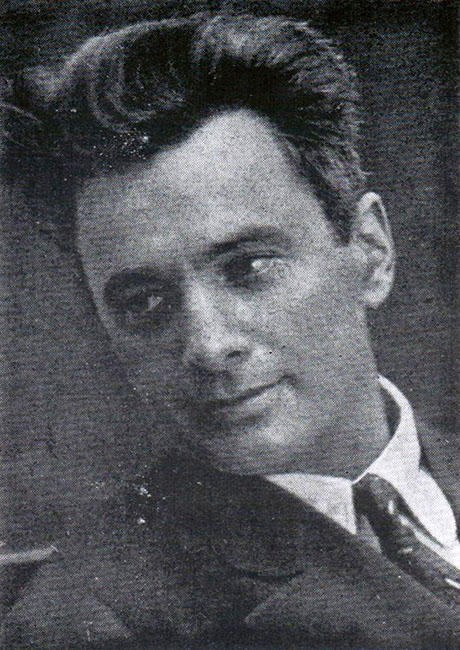Aron Kushnirov (Arn Kushnirovich) was born in 1890 in the town of Boiarka, Kiev Province. His father, who was a forester, died when Aron was 13. The boy stopped attendingheder, his Jewish religious school, and began to work at a flour depot in Kiev. He also worked on educating himself. In Kiev he became acquainted with the Yiddish poets Dovid Gofshteyn and Osher Shvartsman and then began to write Yiddish poems himself.
Kushnirov fought from 1914 to 1918 in World War I and received the highest honor for soldiers, the St. George Cross. In 1920 he joined the Red Army and fought in the Soviet-Polish war. After that his career in literature began. Yiddish poems by him appeared in several prestigious Soviet publications and a number of collections of his poetry were issued. He became a leading Soviet Yiddish poet and translated many works into Yiddish from classical works of Russian and other European languages. He was one of the main figures of the proletarian trend in Soviet Yiddish literature and, in 1929, he published a play about the Bundist Hirsh Lekert, who was executed for his 1902 shooting of Vilna's governor-general, Victor Von Wahl, in revenge for his abuse of Jewish workers. In the 1920s Lekkert became a major symbol of Jewish revolutionary heroism.
On July 4, 1941, very soon after war broke out between the Soviet Union and Nazi Germany, the 51-year-old Kushnirov went to the Union of Soviet Writers and volunteered for the Narodnoe opolchenie (a kind of national guard). He was assigned to the writers' company, which consisted solely of literary figures. The literary critic Moyshe Notovich described Aron in this role thus:
"you should have seen how the poet Aron Kushnirov taught his 'platoon' to march, he translated the rigor and precision of poetic line and rhythm into the step of a soldier. A soldier in line and a [poetic] line in a soldier – that is how one can characterize Kushnirov the poet and soldier" (GARF 8114-1-255, copy YVA JM/26174).
Soon Kushnirov and his platoon were at the front, where they took part in fighting the Nazis. In October 1941, when he was already in the ranks of the regular Red Army, Kushnirov and his comrades were surrounded. In order to keep up their morale in very difficult and dangerous conditions, he organized a frontline bulletin. During the fighting he personally bayoneted a German soldier who had an automatic weapon and succeeded in saving the division's Party documents from being captured. On October 23, 1941 he became secretary of the editorial board of the division newspaper Doblest' (Valor). Often, in order to gather material for his publication he visited the front lines under enemy fire. In the course of those years he wrote many articles and composed humorous verses that were popular among the soldiers of his division, as well as articles and poems that were published in Eynikayt. In 1942 he became a member of the editorial board of that newspaper and a member of the presidium of the Jewish Anti-fascist Committee. As a poet and Soviet officer, he spoke at the second meeting of representatives of the Jewish people, which took place in Moscow in May 1942.
Kushnirov ended the war with the rank of major and was awarded the Order of the Red Star and the For Combat Merit Medal. After the war, in 1947-1948, he was the editor-in-chief of the Moscow Yiddish literary journal Heymland. Kushnirov died of cancer of the throat in September 1949 at the very height of Stalin's postwar repression against the members of Jewish intelligentsia.
Aron Kushnirov's speech at the second meeting of representatives of the Jewish people, 1942
From the text prepared by Aron Kushnirov for delivery at the second meeting of representatives of the Jewish people on May 24, 1942 in Moscow. Although his text had been, of course, subjected to ideological censorship, Kushnirov stressed the role of Jews in the war and the appreciation of their deeds by non-Jewish comrades in arms:
"I have come from the front, where the heroic Red Army with a fiery broom is sweeping the fascist filth from the Soviet land. Eleven months ago, I, a Yiddish poet, together with many other poets and writers, Jewish, Russian, Ukrainian, Belarusian and Georgian, I volunteered to fight for our Soviet homeland. With rifle in hand, we did not abandon our weapon the pen. We dealt the enemy blows with both our bayonets and our pens….
My brother Sergeant Vekselman! I remember your oath – to fight for Moscow to your last drop of blood. Together with the fighters of your unit, Russians and Tatars, not sparing your life, you carried out your oath to the very end. The German tanks did not pass where you opposed them with your chest.
Glorious son of our people Major Zalman Osherov! [He was killed on March 14, 1942.] Only a few days ago I stood before your grave right near the front lines. For the triumph and victory of our homeland you selflessly gave up your 40-year old life. And your fellow fighters – brave, distinguished Russian artillery men, adorned your grave with the first spring flowers and swore over your grave to beat the fascist monster until it is completely destroyed.
And you, my friend and comrade in our heroic division, battalion commissar Leibovich! Of course you felt national pride for the respect which you earned by your valor and dauntlessness in combat…."
From: GARF 8114-1-1125, copy JM/26340.







